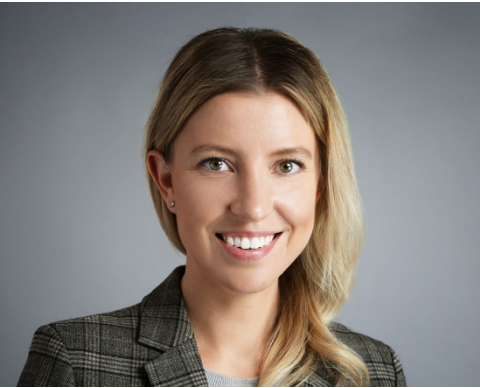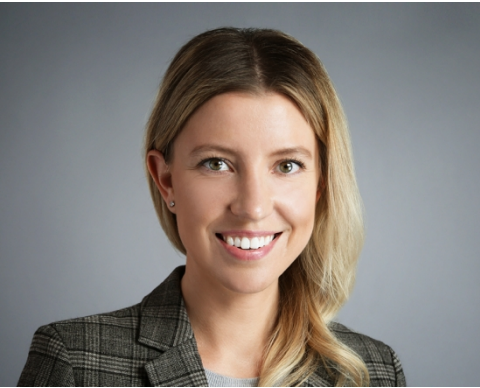Kara Smith is an associate attorney at Neal Gerber Eisenberg (NGE) in Chicago Illinois. She graduated from Purdue University in 2013 before attending Loyola University Chicago School of Law. She was first introduced to Intellectual Property (“IP”) Law in her first semester Property course.

While at Loyola she represented the school as a Student Member of the Richard Linn Inn of Court and as a Vis Moot International Commercial Arbitration Fellow. She was a Civil Procedure tutor for Professor Richard Michael and was the Chair of Professional Development for the National Security Law Association.
Kara joined NGE after graduating cum laude from Loyola in 2017. Her practice areas include trademark, copyright, and patent enforcement and litigation. She also works as an adjunct professor at Loyola, teaching Advanced Legal Writing in Intellectual Property and coaches the Vienna Vis Moot team.
Why did you choose Loyola and why would you recommend it to incoming law students?
I chose Loyola because I was searching for the right atmosphere when I was looking at law schools. The atmosphere at Loyola particularly impressed me because professors and students alike reached out to me with advice and helpful information about what to expect as a Loyola student, both before and after I was accepted. This was the first school I visited that felt like a community where my peers also wanted me to succeed.
Loyola also offered a summer program that taught me how to prepare for classes. This included how to approach readings and what to include in creating case outlines, which I found very helpful.
Finally, Loyola’s alumni network is always happy to help out by sharing information about practicing law and by offering so much advice about job applications, managing your time and extracurriculars. This was the larger community I was looking for when I began my search for the right law school for me.
Did you know you were interested in IP when you came to Loyola?
No, I actually came to Loyola interested in Environmental Law, but my 1L Property Professor, Professor Sag, spent a week of the semester on Intellectual Property and Copyright cases. I was so fascinated that I found myself researching other IP cases. When it came time to sign up for second semester classes I enrolled in Global Access to Medicine: A Patent Perspective with Professor Ho. It is one of the IP classes available to 1L’s, along with a specialized legal writing course, and focuses on how different patent systems around the world impact access to affordable medicine.
During my 1L year I also volunteered with Loyola’s Street Law Program. The program partnered with “in-house attorneys” – attorneys that work for a company rather than a law firm – at GE. Because of the connections I made in the program, I decided to apply to work in-house at GE that summer. I was offered an opportunity to work in New York at their global research center. This opportunity exposed me to engineers and patent attorneys who solidified my interest in IP. When I returned to Loyola as a 2L, I leaned into that interest and took more IP-focused classes that ultimately led to my position at NGE today.
What school extracurriculars do you think are most helpful for practicing law?
The Moot Court and Vis Moot programs both emphasize a variety of legal skills. Each has a writing component as well as an oral presentation component. The writing component may be a document, such as a brief, which is important for litigation. The oral component is similar to what one would experience in court. Because these are critical skills in all areas of legal practice, they are some of the most realistic experiences in law school that you can translate to practice.
The Vis Moot competition also has a networking component. Each year, hundreds of schools from all over the world meet and compete in Vienna and Hong Kong. I was actually a coach for the Hong Kong team last year and will be coaching the Vienna team this year.
What would you recommend to law students interested in a career in IP?
Three main things. First, build your network. Specifically, start to build a network within the IP community. One way to build your network is to look for volunteer opportunities and attend different IP association events. One of the main organizations in Chicago that focuses on IP is the Intellectual Property Lawyers Association of Chicago (“IPLAC”). Another organization I was introduced to Professor Ho is called the Ladies in IP Society (“LIPS”). Finally, the Linn Inn is another association for IP attorneys in Chicago. I didn’t manage to do everything when I was in school, but I did do some events which made the IP world smaller and less daunting. For example, I met several attorneys through these events that I later worked under. You never know, you might get a summer job out of it!
Second, definitely take all the IP classes that you can – but also take other classes that interest you even if they aren’t related to IP. While it’s great to specialize, you still want to be a well-rounded applicant and many IP-related issues cross over into other areas. An issue might be primarily IP, but it still has an impact on the business as a whole. Different IP protections might impact the larger business in different ways. Knowing more than just the IP-specific issue will give you an edge in your practice! A lot of what you learn in classes can also be learned on the job, so its ok to branch out and pursue other interests in the classroom.
Finally, whether your interests are transactional or litigation, see if you can find an extracurricular activity that you can use to build those skills. Getting a good foundation while you are in law school allows you to use skills confidently when you begin working.
Lily Parker
Associate Blogger
Loyola University Chicago School of Law, J.D. 2022
